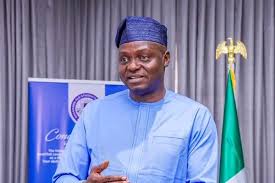The National Chairman of the All Progressives Congress (APC), Prof. Nentawe Yilwatda, has attributed the growing cases of human trafficking and irregular migration in Nigeria to decades of economic hardship and social decline.
Yilwatda made this known on Monday during the public presentation of “Vicious Red Circle,” a new novel by Ambassador Alex Ugochukwu Oriaku, held at the Shehu Musa Yar’Adua Centre in Abuja. The book focuses on the grim realities of human trafficking in Nigeria and Africa.
Speaking at the event, the APC chairman said the country’s long-standing economic challenges had created conditions that make many citizens, especially young people, vulnerable to traffickers and illegal migration networks.
“Our economic decay over four decades created fertile ground for exploitation,” Yilwatda said. “When industries collapsed and hope disappeared, migration and trafficking surged.”
He recalled his past experience as Minister of Humanitarian Affairs and Chairman of the African-European Migration and Development Team, noting that poverty, unemployment, and the collapse of local industries had pushed many Nigerians to seek opportunities abroad — often falling prey to traffickers in the process.
Yilwatda stressed that addressing the problem requires more than government policies, calling for community-driven and inclusive solutions that engage citizens at the grassroots.
“We can stop this cycle,” he said. “This book challenges us to do so. It must not remain on your shelf — let it remain in your heart.”
He urged Nigerians, civil society groups, and the private sector to join hands with government agencies to tackle the root causes of human trafficking by investing in education, skills acquisition, and local job creation.
On his part, Ambassador Oriaku, the author of Vicious Red Circle, described human trafficking as “a vicious, self-perpetuating cycle of exploitation, vulnerability, and silence.” He said his novel was written not just as a work of fiction but as a call to action for society to confront the human suffering behind trafficking and forced migration.
“The victims are often young people seeking better lives. They end up in modern-day slavery, and the silence around their pain must end,” Oriaku said.
The event was chaired by Yilwatda and attended by lawmakers, government officials, diplomats, and development partners, all of whom agreed that stronger collaboration was needed to curb the menace of trafficking in Nigeria.
In recent years, Nigeria has been identified as one of the major sources of victims trafficked to Europe, the Middle East, and North Africa, mostly for forced labor and sexual exploitation. Experts have consistently linked the problem to rising unemployment, insecurity, and poverty.
Yilwatda concluded by calling for renewed national commitment to economic recovery and youth empowerment, stressing that “only hope, opportunity, and inclusion can break the chains of trafficking.”

